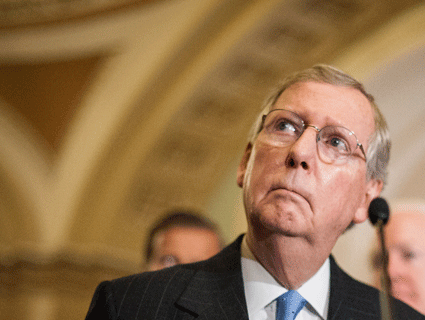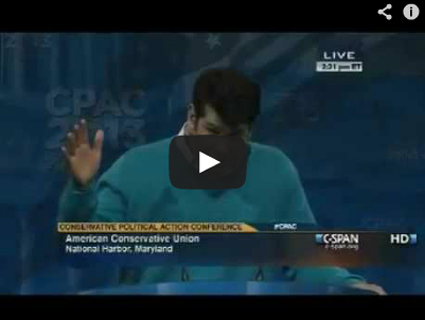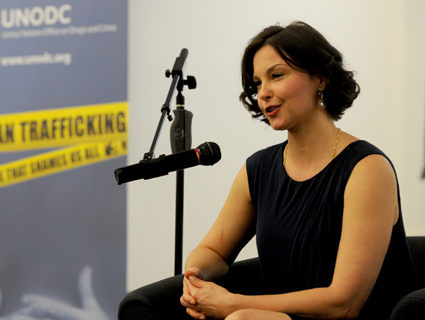This story has been updated with statements from Mitch McConnell’s campaign and Mother Jones.
On February 2, Mitch McConnell, the Republican leader in the US Senate, opened up his 2014 reelection campaign headquarters in Louisville, Kentucky, and in front of several dozen supporters vowed to “point out” the weaknesses of any opponent fielded by the Democrats. “They want to fight? We’re ready,” he declared. McConnell was serious: Later that day, he was huddling with aides in a private meeting to discuss how to attack his possible Democratic foes, including actor/activist Ashley Judd, who was then contemplating challenging the minority leader. During this strategy session—a recording of which was obtained by Mother Jones—McConnell and his aides considered assaulting Judd for her past struggles with depression and for her religious views.
Last month, Judd announced she wouldn’t challenge McConnell, whose reelection campaign could become one of the most watched races of the 2014 cycle (if a serious Democratic opponent emerges). But at the February 2 meeting, McConnell and his team were fixated on Judd. McConnell told his aides that at the early stage of the campaign they had to clobber any potential challenger:
I assume most of you have played the, the game Whac-A-Mole?” (Laughter.) This is the Whac-A-Mole period of the campaign…when anybody sticks their head up, do them out.
Referring to the Louisville newspaper, he continued, “And we’re even planning to do it with the Courier here shortly”—indicating he was eager for battle with the media. (A female aide piped up, “We’re anxious for that.”)
For much of the Judd discussion, McConnell was silent as aides reviewed the initial oppo research they had collected on Judd and weighed all the ways they could pummel her. The recording was provided to Mother Jones last week by a source who requested anonymity. (The recording can be found here; a transcript is here.) McConnell’s Senate office and his campaign office did not respond to requests for comment.
The aide who led the meeting began his presentation with a touch of glee: “I refer to [Judd] as sort of the oppo research situation where there’s a haystack of needles, just because truly, there’s such a wealth of material.” He ran through the obvious: Judd was a prominent supporter of President Barack Obama, Obamacare, abortion rights, gay marriage, and climate change action. He pointed out that she is “anti-coal.”
But the McConnell gang explored going far beyond Judd’s politics and policy preferences. This included her mental health. The meeting leader noted:
She’s clearly, this sounds extreme, but she is emotionally unbalanced. I mean it’s been documented. Jesse can go in chapter and verse from her autobiography about, you know, she’s suffered some suicidal tendencies. She was hospitalized for 42 days when she had a mental breakdown in the ’90s.
In her 2011 memoirs, All That Is Bitter & Sweet, Judd recounts her past bouts with depression, noting that she had considered suicide as a sixth-grader and that as an adult she had checked into a rehab center for depression. (The Jesse mentioned might have been Jesse Benton, whose wife is the granddaughter of former Rep. Ron Paul (R-Texas) and the niece of Sen. Rand Paul (R-Ky.)*—who was hired last year by McConnell to run his reelection effort. Three years ago, Benton worked on Rand Paul’s successful tea-party-driven Senate primary campaign against a GOP establishment candidate handpicked by McConnell. Benton did not respond to a request for comment.)
The McConnell aides, though, raised the possibility of doing more than calling attention to Judd’s well-known history; they discussed how they could make her seem a true weirdo. After citing Judd’s previous mental-health issues as possible campaign ammo, the meeting leader played a tape in which Judd spoke about the culture shock and blast of sensory stimulation she has sometimes experienced when returning to the United States from overseas:
I call it the American anesthesia. You know, I come back to this country. I freak out in airports. The colors, the sounds, all those different ways of packaging the same snack but trying to, you know, make it look like it’s distinct and different and convince consumers that they have to have it. I mean all of that. The last time I came home from a trip, I absolutely flipped out when I saw pink fuzzy socks on a rack. I mean, I can never anticipate what is going to push me over the edge.
The McConnell aides burst out laughing as the Judd quote continued:
But in a few weeks, you know, I’m driving along smooth roads and I think nothing of it. I’m, you know, choosing between four different brands of cereal from plastic dispensers so that I don’t have to have, you know, ugly, mismatched boxes on my shelf, and I don’t think anything of it.
Amid the guffaws, the meeting leader quipped, “So pink fuzzy socks are of concern.”
He also contended that Judd was vulnerable on the religion front:
She is critical…of traditional Christianity. She sort of views it as sort of a vestige of patriarchy. She says Christianity gives a God like a man, presented and discussed exclusively with male imagery, which legitimizes and seals male power, the intention to dominate even if that intention is nowhere visible.
He maintained that Judd was no fan of the American family:
I think too she’s clearly sort of anti-sort-of-traditional American family. I think Jesse tracked this down. She described having children as selfish, and she thinks it’s unconscionable to breed…She also is critical of, of fathers giving away their daughters in marriage ceremonies. She says it’s a common vestige of male dominion over a women’s reproductive status when her father gives her away at a wedding.
He played another recording of Judd:
I still choose the God of my understanding as the God of my childhood. I have to expand my God concept from time to time, and you know particularly I enjoy native faith practices, and have a very nature-based God concept. I’d like to think I’m like St. Francis in that way. Brother Donkey, Sister Bird.
Laughter erupted again, with one guy in the meeting exclaiming, “Brother Donkey, Sister Bird!” The group didn’t seem to realize that Judd was referring to well-known stories about St. Francis, who once preached a sermon to birds—”my little sisters”—and who referred to his own body as the “Brother Donkey.” (In her book, Judd identifies herself as a Christian and often refers to church and prayer.)
With his comrades laughing about Judd’s reference to donkeys and birds, the chief presenter remarked, “That’s my favorite line so far. Absolute favorite one so far.”
The McConnellites were keen on portraying Judd as a carpetbagger. The oppo researchers had located clips when Judd had referred to San Francisco or Tennessee as her home. “Not only has she clearly claimed Tennessee as her home,” the meeting leader remarked, “she’s actually mocked Kentucky to Tennessee audiences. She was bemoaning the low voter turnout among women in Tennessee. She said, ‘People, that’s worse than even in Kentucky.'” And, he added, she owned a mansion in Scotland.
The McConnell team clearly believed that they had plenty to work with and relished Judd’s possible entry into the race. “That’s sort of the tip of the iceberg,” the meeting leader remarked. “Like I said, you know, we’re still drilling down and there’s a wealth of material, and it’s just hard to get all the way around it.”
After running through Judd’s liabilities, the group turned to Alison Lundergan Grimes, the 34-year-old Democratic secretary of the state, who was (and remains) a prospective McConnell challenger. The fellow in charge of the meeting referred to a Freedom of Information Act request filed “through a third party” that aimed to uncover damaging information about her actions in government, and he noted, “The best hit we have on her is her blatantly endorsing the 2008 Democratic national platform.” He also claimed “she definitely has a very sort of self-centered, sort of egotistical aspect.” His evidence? Grimes “frequently” refers to herself in the third person. And to make this point, he played a recording in which Grimes noted she had made the last name of her in-laws “popular” when she married into their family. He seemed to be working with scraps. As of this meeting, the McConnell squad had not dug up much on Grimes.
With Judd’s decision not to run, McConnell won’t have to decide whether he must assail an opponent for being candid about her past depression or for holding religious views he can mock as unconventional in order to keep his Senate seat. But he and his crew, no surprise, were prepping for an all-out crusade against Judd. Two weeks after this meeting, Benton was interviewed by a local NPR station and said that McConnell had “set a goal of running the best statewide campaign in the history of United States American politics.” And that, no doubt, included the best oppo research operation McConnell’s hefty campaign funds could buy.
Update: Jesse Benton, McConnell’s campaign manager, released a statement responding to this story on Tuesday morning: “We’ve always said the Left will stop at nothing to attack Sen. McConnell, but Nixonian tactics to bug campaign headquarters is above and beyond.”
Update 2: The McConnell campaign has reportedly asked the Federal Bureau of Investigation and the US Attorney’s office in Louisville to investigate how the tape was made.
Update 3: Here is more from Benton, via NBC News: “Senator McConnell’s campaign is working with the FBI and has notified the local U.S. Attorney in Louisville, per FBI request, about these recordings. Obviously a recording device of some kind was placed in Sen. McConnell’s campaign office without consent. By whom and how that was accomplished will presumably be the subject of a criminal investigation.”
Update 4/Mother Jones statement: We are still waiting for Sen. Mitch McConnell to comment on the substance of the article. Before posting, we contacted his Senate office and his campaign office—in particular, his campaign manager, Jesse Benton—and no one responded. As the story makes clear, we were recently provided with the tape by a source who wishes to remain anonymous. We published the article on the tape due to its obvious newsworthiness. We were not involved in the making of the tape, but it is our understanding that the tape was not the product of any kind of bugging operation. We cannot comment beyond that, except to say that under the circumstances, our publication of the article is both legal and protected by the First Amendment.
Correction: The text has been updated to reflect that Benton is Ron Paul’s grandson by marriage only—he married Ron Paul’s granddaughter.









